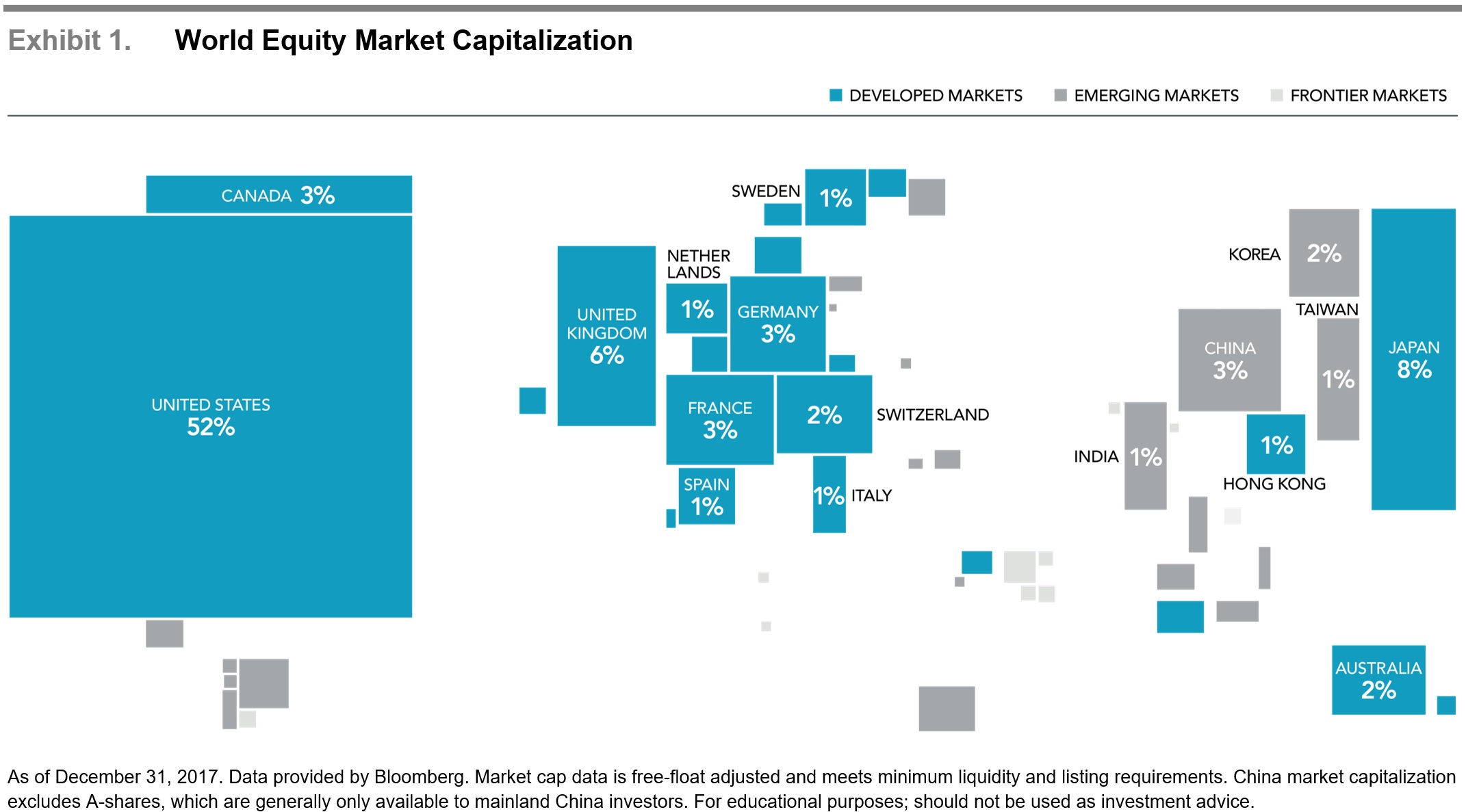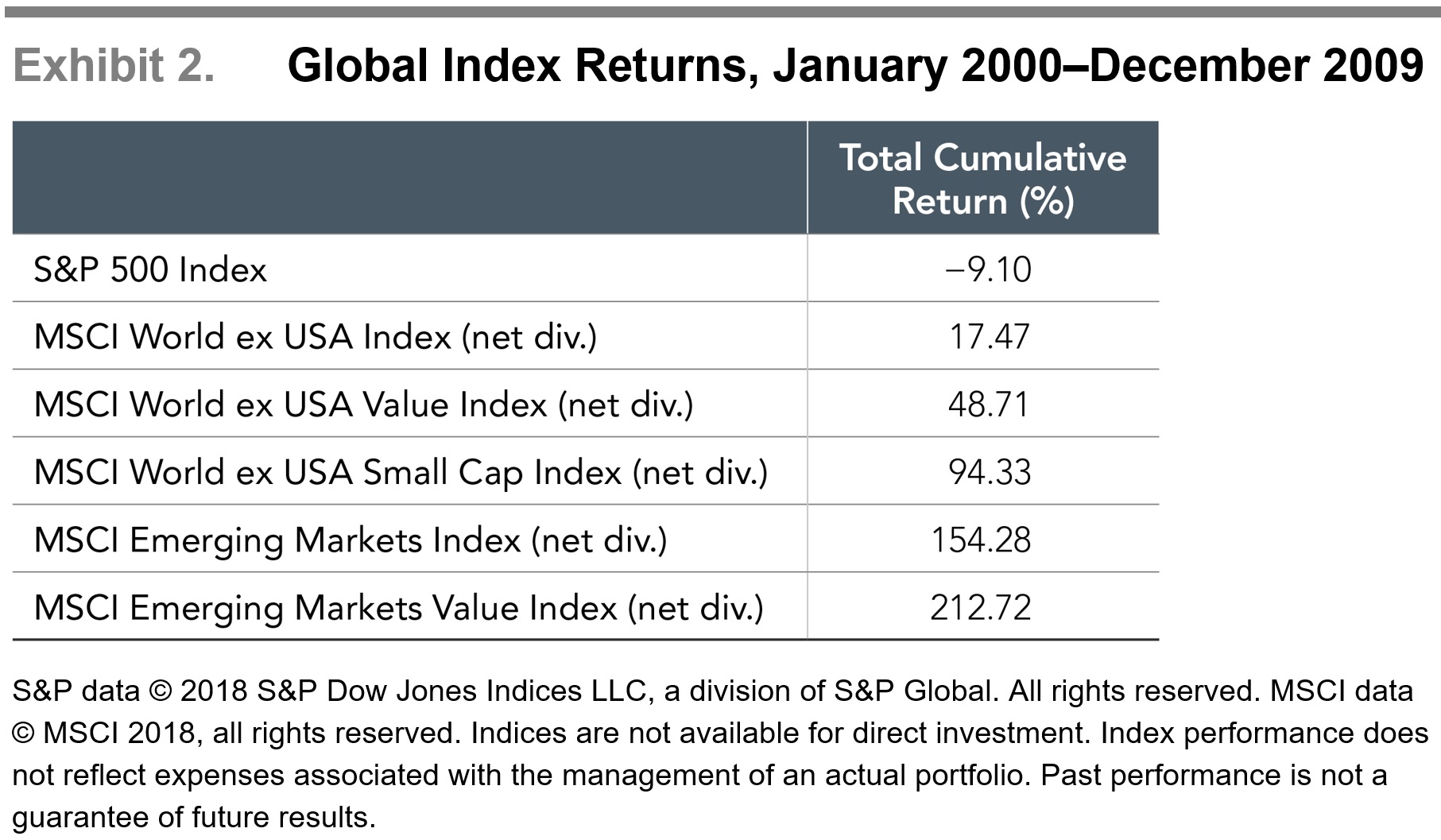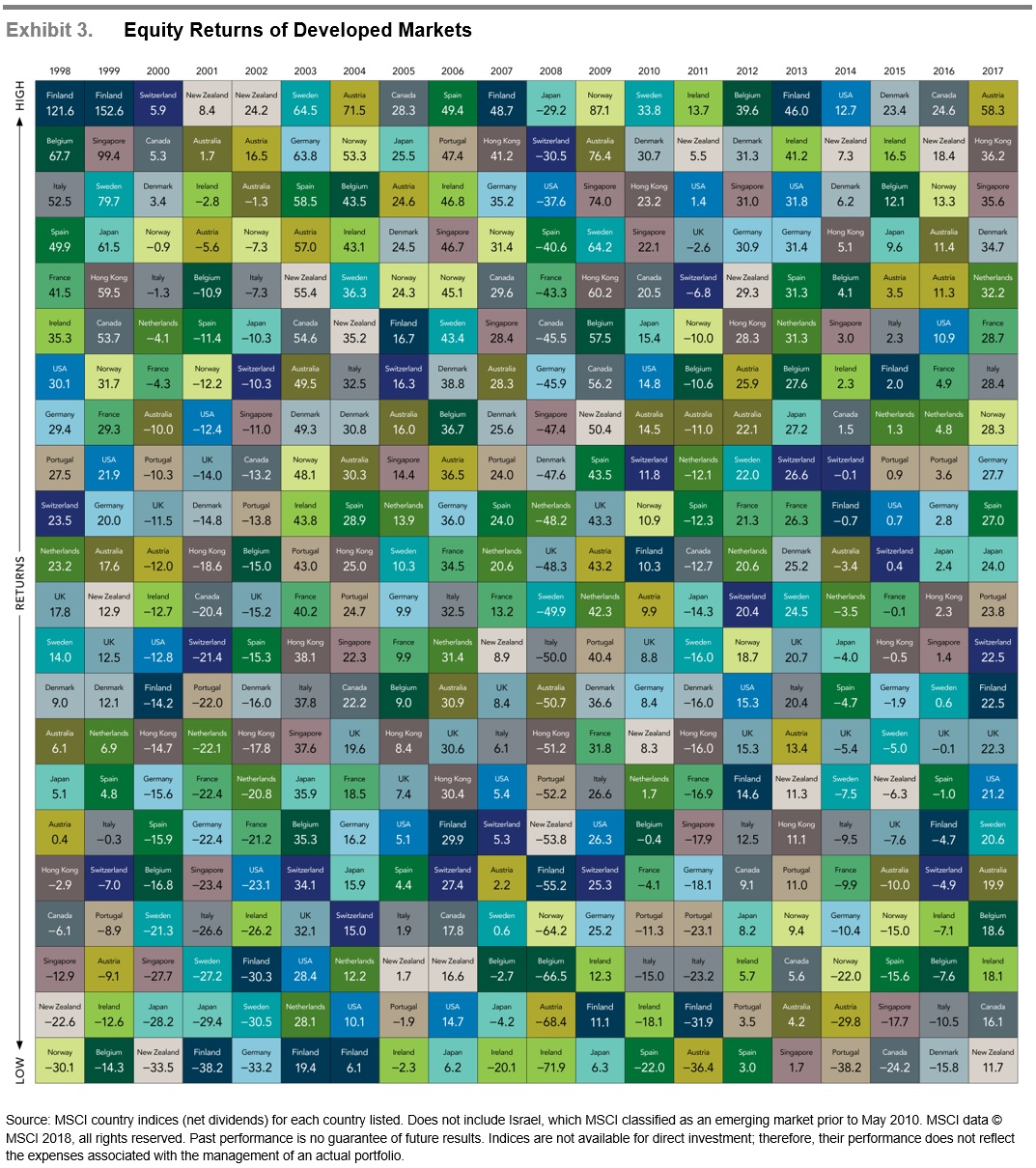Why Should You Diversify?
As 2019 begins, and with U.S. stocks outperforming non-U.S. stocks in recent years, some investors have again turned their attention towards the role that global diversification plays in their portfolios.
For the five-year period ending October 31, 2018, the S&P 500 Index had an annualized return of 11.34% while the MSCI World ex USA Index returned 1.86%, and the MSCI Emerging Markets Index returned 0.78%. As U.S. stocks have outperformed international and emerging markets stocks over the last several years, some investors might be reconsidering the benefits of investing outside the U.S.
While there are many reasons why a U.S.-based investor may prefer a degree of home bias in their equity allocation, using return differences over a relatively short period as the sole input into this decision may result in missing opportunities that the global markets offer. While international and emerging markets stocks have delivered disappointing returns relative to the U.S. over the last few years, it is important to remember that:
1. Non-U.S. stocks help provide valuable diversification benefits.
2. Recent performance is not a reliable indicator of future returns.
There's a World of Opportunity in Equities
The global equity market is large and represents a world of investment opportunities. As shown in Exhibit 1, nearly half of the investment opportunities in global equity markets lie outside the U.S. Non-U.S. stocks, including developed and emerging markets, account for 48% of world market capitalization1 and represent thousands of companies in countries all over the world. A portfolio investing solely within the U.S. would not be exposed to the performance of those markets.

The Lost Decade
We can examine the potential opportunity cost associated with failing to diversify globally by reflecting on the period in global markets from 2000–2009. During this period, often called the “lost decade” by U.S. investors, the S&P 500 Index recorded its worst ever 10-year performance with a total cumulative return of –9.1%. However, looking beyond U.S. large-cap equities, conditions were more favorable for global equity investors as most equity asset classes outside the U.S. generated positive returns over the course of the decade. (See Exhibit 2.) Expanding beyond this period and looking at performance for each of the 11 decades starting in 1900 and ending in 2010, the U.S. market outperformed the world market in five decades and underperformed in the other six.2 This further reinforces why an investor pursuing the equity premium should consider a global allocation. By holding a globally diversified portfolio, investors position themselves to capture returns wherever they occur.

Pick a Country?
Are there systematic ways to identify which countries will outperform others in advance? Exhibit 3 illustrates the randomness in country equity market rankings (from highest to lowest) for 22 different developed market countries over the past 20 years. This graphic conveys how difficult it would be to execute a strategy that relies on picking the best country and the resulting importance of diversification.

In addition, concentrating a portfolio in any one country can expose investors to large variations in returns. The difference between the best- and worst performing countries can be significant. For example, since 1998, the average return of the best performing developed market country was approximately 44%, while the average return of the worst-performing country was approximately –16%. Diversification means an investor’s portfolio is unlikely to be the best or worst performing relative to any individual country, but diversification also provides a means to achieve a more consistent outcome and more importantly helps reduce and manage catastrophic losses that can be associated with investing in just a few stocks or a single country.
A Diversified Approach
Over long periods of time, investors may benefit from consistent exposure in their portfolios to both U.S. and non-U.S. equities. While both asset classes offer the potential to earn positive expected returns in the long run, they may perform quite differently over short periods. While the performance of different countries and asset classes will vary over time, there is no reliable evidence that this performance can be predicted in advance. An approach to equity investing that uses the global opportunity set available to investors can provide diversification benefits as well as potentially higher expected returns.
1. The total market value of a company’s outstanding shares computed as price times shares outstanding.
2. Source: Annual country index return data from the Dimson-Marsh-Staunton (DMS) Global Return Data, provided by Morningstar, Inc.
Past performance does not guarantee future results. All investments include risk and have the potential for loss as well as gain.
Data sources for returns and standard statistical data are provided by the sources referenced and are based on data obtained from recognized statistical services or other sources we believe to be reliable. However, some or all information has not been verified prior to the analysis, and we do not make any representations as to its accuracy or completeness. Any analysis nonfactual in nature constitutes only current opinions, which are subject to change. Benchmarks or indices are included for information purposes only to reflect the current market environment; no index is a directly tradable investment. There may be instances when consultant opinions regarding any fundamental or quantitative analysis do not agree.
The commentary contained herein has been compiled by W. Reid Culp, III from sources provided by TAGStone Capital, Capital Directions, DFA, Vanguard, Morningstar, as well as commentary provided by Mr. Culp, personally, and information independently obtained by Mr. Culp. The pronoun “we,” as used herein, references collectively the sources noted above.
TAGStone Capital, Inc. provides this update to convey general information about market conditions and not for the purpose of providing investment advice. Investment in any of the companies or sectors mentioned herein may not be appropriate for you. You should consult your advisor from TAGStone for investment advice regarding your own situation.
